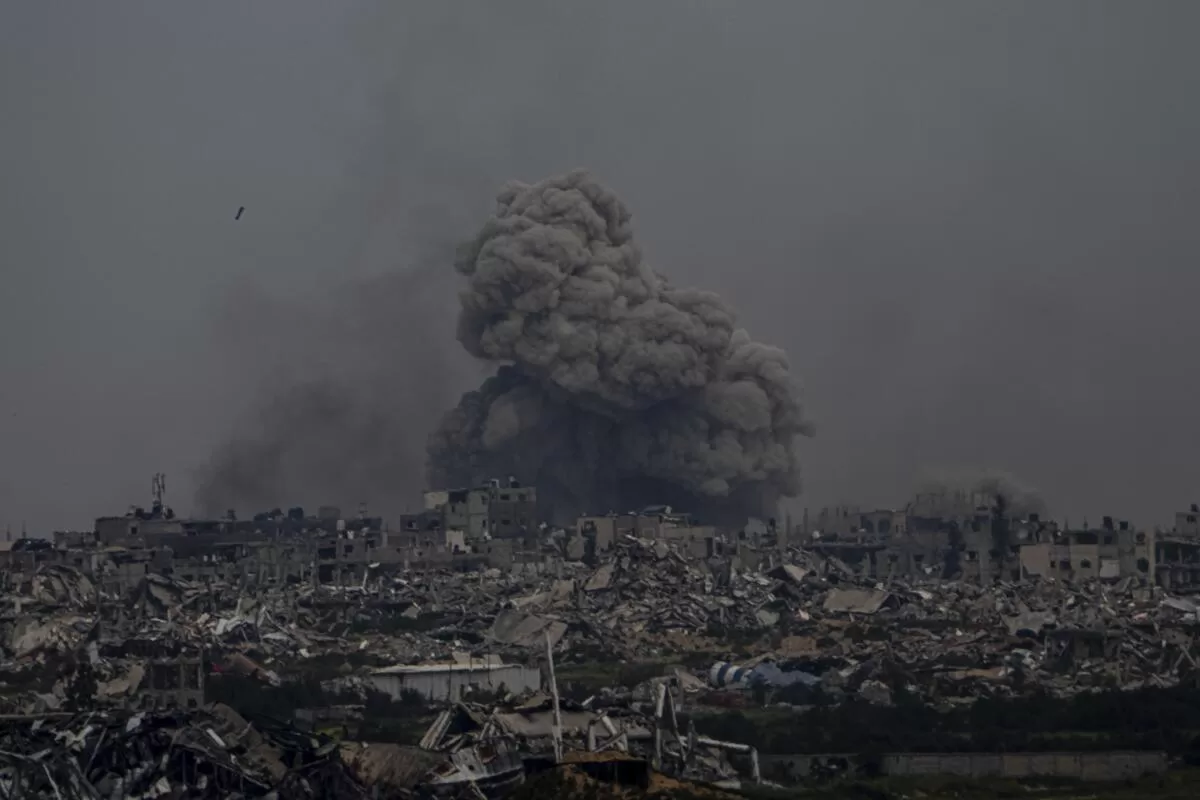The vote came as Secretary of State Antony J. Blinken was in the midst of his latest mission to the region since the war broke out following a Hamas-led attack on Israel in October.
The diplomatic moves come at a tense juncture. The Biden administration has been on an increasingly combative footing with Israeli Prime Minister Benjamin Netanyahu over the conduct of Israel’s offensive, which has killed at least 32,000 Palestinians in Gaza, according to Gazan health officials.
(Ariel Schalit / Associated Press)
The Security Council resolution, in calling for an immediate halt to fighting, was meant to facilitate urgently needed deliveries of humanitarian aid to Gaza, where international groups have warned of looming famine in the northern part of the narrow Mediterranean enclave.
Nearly all of Gaza’s 2.3 million people have been displaced from their homes and large swaths of the territory have been flattened by intense Israeli bombardment. Disease and hunger are rampant.
But the U.S.-backed effort broke down over Russia’s accusations that the U.S., Israel’s staunchest ally, was “misleading” the international community through some of the language contained in the resolution. The wording, which stressed the “imperative” for a cease-fire, also backed diplomatic efforts to secure the freedom of remaining hostages among some 250 people seized during the Hamas-led attack on southern Israel on Oct. 7 that killed about 1,200 people.
In Tel Aviv, Blinken held more than two hours of talks Friday with Netanyahu, who has made known his deep displeasure with depictions of him as an impediment to peace in a speech a week ago by the highest-ranking Jewish elected official in the United States, Sen. Charles E. Schumer of New York, the Senate Democratic leader. Biden said he thought the speech was “good.”
Netanyahu said after meeting Blinken that he had turned aside U.S. appeals to drop plans for a ground invasion of Rafah, the southern Gaza city where more than 1 million Palestinians are sheltering. Israel has been saying for weeks it will go after Hamas fighters there, but there has been a chorus of preemptive international condemnation over the danger to civilians.
Netanyahu declared that there was “no way to defeat Hamas without entering Rafah,” adding that he informed Blinken that Israel would not be deterred by U.S. opposition.
“I hope we will do this with the support of the United States,” the Israeli leader said. “But if necessary, we will do it alone.”
Blinken reiterated U.S. support for the overarching goal of defeating Hamas but said the Biden administration believes there are means of doing so other than a ground push into Rafah.
In Gaza, the latest fighting, as always, yielded competing claims. Israel said it had killed or captured hundreds of Hamas militants during a five-day operation at the Shifa Hospital complex in Gaza City. Hamas scoffed at the Israeli account, saying its fighters were not present.
At the U.N., 11 members of the Security Council supported the U.S-sponsored resolution, but the measure failed due to the “no” votes by two permanent members who wield veto power, Russia and China. Algeria also voted against it, and Guyana abstained.
Until now, the Biden administration has repeatedly moved to shield Israel from cease-fire calls at the world body, saying Israel had a right to defend itself after the Oct. 7 attack. The U.S. also sought to directly link cease-fire calls to demands to free the hostages, of whom about 100 are believed to still be alive.
The Security Council defeat was especially stinging for the Biden administration. In an effort to evince a more neutral position that had greater sympathy for the Palestinians, amid domestic pro-Palestinian political uproar, U.S. officials for weeks sought to put forward a resolution that prioritized a cease-fire.
But China and Russia were keen to be the spoiler.
The U.S. ambassador to the United Nations, Linda Thomas-Greenfield, said their votes were “petty” and “deeply, deeply cynical.”
“First,” she said at the U.N. headquarters in New York, “Russia and China still could not bring itself to condemn Hamas’ terrorist attack on Oct. 7…. Russia and China refuse to condemn Hamas for burning people alive, for gunning down innocent civilians at a concert, for raping women and girls, for taking hundreds of people hostage.
“The second reason behind this veto,” she continued, “is not just cynical, it’s also petty. Russia and China simply did not want to vote for a resolution that was penned by the United States, because it would rather see us fail than to see this Council succeed.”
Blinken was not faring any better in Tel Aviv. The schism between the Biden administration, advocating for an easing of the war, and Netanyahu, who is determined to carry the military operation to its end and “destroy” Hamas, has grown.
Separate from his meeting with Netanyahu, Blinken spoke to Israeli President Issac Herzog, “emphasizing the need for Israel to take all possible measures to protect Palestinian civilians in Gaza — including through the prompt, effective facilitation of critical humanitarian assistance throughout Gaza,” according to the State Department.
The statement used unusually tough language for dealing with an ally like Israel. Herzog is seen as more moderate than Netanyahu, but he has not shown a willingness to advocate for easing the military operations.
